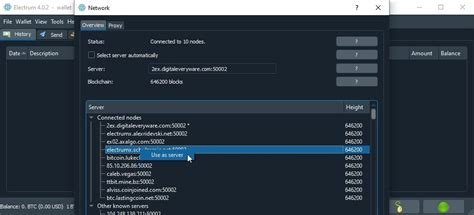Ethereum: What are the security considerations for hosting *your own* Electrum server?
Securing Your Own Electrum Server: A Guide for Paranoid Developers
As a developer who values the security of their own systems, you’re right to be cautious when hosting an Electrum client on your own server. Electrum is a popular and widely-used wallet software that stores private keys securely using SHA-256 hashing. However, with great power comes great responsibility, and ensuring the security of your Electrum server requires careful consideration.
In this article, we’ll explore the key security considerations for hosting an Electrum server on your own network or isolated environment.
1. Choose a Secure Hosting Method
Before selecting any hosting method, consider the following:
- DNS Security: Use a reputable DNS service provider that offers 100% uptime and DDoS protection.
- Web Application Firewall (WAF): Install a WAF to block potential threats and prevent brute-force attacks.
- Firewall Configuration: Ensure your firewall is configured to allow only necessary traffic and set up an intrusion prevention system.
2. Set Up to Secure File System
When setting up your Electrum server, choose a file system that offers:
- LVM (Logical Volume Management): A secure and highly available storage solution for your operating system.
- Cryptographic Hashing: Use a hash function like SHA-256 to store private keys securely.
3. Implement Strong Password Protection
To prevent unauthorized access to your Electrum server, implement strong password protection:
- Password Hashing: Store passwords in a hashed format using a library like
bcryptorargon2.
- Secure Password Storage: Use a secure password storage mechanism, such as an encrypted password manager.
4. Use Secure Communication Protocols

When communicating with your Electrum client, use secure protocols:
- SSL/TLS (HTTPS): Enable SSL/TLS encryption to protect data in transit.
- Secure Sockets Layer/Transport Layer Security (SSL/TLS): If you’re using a non-SSL/TLS connection, consider switching to HTTPS.
5. Monitor Server Activity and Logs
Regularly monitor your server activity and logs:
- Log File Rotation: Rotate log files regularly to prevent storage of sensitive information.
- System Monitoring Tools: Use tools like
nagiosorsyslog-ngto monitor system performance and detect potential issues.
6. Implement Regular Backups
To ensure data integrity, implement regular backups:
- Cloud Backup Services: Store backups with a reputable cloud backup service provider.
- Local Storage: Consider using an encrypted local storage solution like LVM.
7. Keep Your Operating System and Electrum Client Up-to-Date
Regularly update your operating system and Electrum client to ensure you have the latest security patches:
- Operating System Updates: Regularly update your operating system to prevent known vulnerabilities.
- Electrum Updates: Ensure you’re running the latest version of the Electrum client.
8. Consider Using a Secure Email Service
When sending emails, consider using a secure email service like protonmail or tutanota.
In conclusion, hosting an Electrum server on your own network requires careful consideration and attention to detail. By implementing these security measures, you can ensure the secure storage of your private keys and prevent potential breaches.
Additional Resources
For more information on securing your Electrum server, consider the following resources:
- Ethereum Developer Documentation: The official Ethereum developer documentation provides detailed information on setting up and securing an Electrum client.
- Electrum Client Documentation: The Electrum client documentation offers guidance on configuring and using the wallet software.